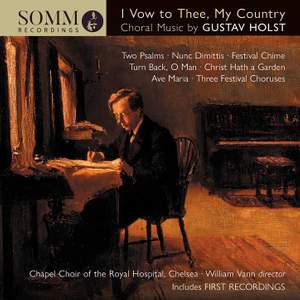
Gustav Holst (1874-1934)
I Vow to Thee, My Country – the complete sacred choral music
Joshua Ryan (organ), Richard Horne (tubular bells)
Chapel Choir of the Royal Hospital Chelsea/William Vann
rec. 2021, Holy Trinity Church, Sloane Square, London
Texts included
SOMM Recordings SOMMCD279 [76]
Holst’s smaller choral works are a fascinating and delightful part of his work. I am thinking particularly of the Choral Hymns from the Rig Veda H. 97-100, the Six Choruses for Male Voices H. 186 and the Seven Partsongs for Female Voices and Strings H. 162. Not long ago we had a complete set of all his carols and Christmas music, under the title Alpha and Omega (review review). Now we have nearly all his remaining small-scale sacred music on what is in effect a companion disc, though from a different team and company. This has already been reviewed by three of my colleagues on MWI (links below) so I shall simply refer to them for details of the works and their background.
They seem to me to be a mixed bag. There are several straight hymns, which include Gird on Thy Sword, Our blest Redeemer and From Glory to Glory Advancing, which are competent work but without any special touches such as characterize Holst’s best pieces. The Four Festival Choruses, with which the disc ends, are all arrangements based on existing tunes, which Holst has decorated and elaborated. The best-known of these is Turn Back, O Man which features one of the composer’s favourite marching basses, while the most interesting is perhaps All People that on Earth Do Dwell, which uses both the well-known tune by Louis Bourgeois and also a chorus from a Bach cantata with an elaborate organ obbligato joining two of the verses.
The works which begin the disc are more exciting. The Nunc Dimittis, well-known in English as part of Anglican Evening Prayer, is set in Latin as used in the old monastic office of Compline for the Roman Catholic cathedral of Westminster. This begins quietly but rises to a triumphant climax. The Two Psalms are fine works but sound better in their original version with strings accompanying. In This World is a simple and charming setting of a poem by the seventeenth century Cavalier poet Robert Herrick. This is really an anthem, as are Man born to Toil, Eternal Father and Ave Maria. The last of these is the most remarkable, being composed for eight-part female voice choir and thereby presenting a challenge for them. It is, however, a beautiful piece.
The Short Festival Te Deum is really short, lasting less than five minutes. It was written with orchestral accompaniment and Holst said that it was not intended for performance with organ. Nevertheless the Holst Society commissioned an organ version of the orchestral part and that is what we get here. It is quite well done but is clearly not authentic.
Finally, we have I Vow to Thee My Country which was written to use the big tune in Jupiter from the Planets. This was first published in the once popular hymn book Songs of Praise in 1925. Nowadays that hymnbook has fallen from use and this setting with it. It is nice to hear once in a while, but I prefer to hear the big tune in its original setting.
A mixed bag then, but with several first recordings it is indispensable to the Holst completist. The performances are excellent, as is the recording, I would like to hear this team tackle the Choral Hymns from the Rig Veda, of which we still lack a complete recording.
Stephen Barber
Previous reviews: Nick Barnard ~ John France ~ John Quinn
Help us financially by purchasing from



Contents
Nunc Dimittis (1915)
Gird on thy sword (1931)
Two Psalms (1912): Psalm 86, Psalm 148
In this World, the Isle of Dreams (c. 1925)
Not Unto Us, O Lord (c. 1893-96)
Our Blest Redeemer (1919)
Short Festival Te Deum (1919)
From Glory to Glory Advancing (c. 1905)
Man Born to Toil (1927)
Eternal Father (1927)
By Weary Stages the Old World Ages (1927)
Christ hath a Garden (1928)
Ave Maria (1894)
I Vow to Thee, My Country (c.1918)
Four Festival Choruses:
A Festival Chime (1916)
All People that on Earth do Dwell (c. 1916-19)
Let All Mortal Flesh Keep Silence (1916)
Turn Back, O Man (1916)


















